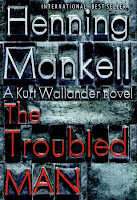 This novel was incredibly bittersweet — not 100% mystery, not 100% your typical Swedish thriller, and there’s an element of incredibly honesty about aging throughout these pages. So often, male authors of a certain age (ahem, John Irving, Rushdie, ahem) tread and re-tread their same themes: men sleeping with younger/older women, ridiculous novels that they’ve written thrice before, and the banner of “literary fiction” seems to save them from ridicule. They rest on their laurels. They rest on the fact that they’ve written great works before. But I call these novels “mid-life crisis on the page.” They generally frustrate me critically and as a reader — they aren’t pushing any boundaries and there’s not a lot of honesty going on. I respect honesty on the page, from a writer, from their characters.
This novel was incredibly bittersweet — not 100% mystery, not 100% your typical Swedish thriller, and there’s an element of incredibly honesty about aging throughout these pages. So often, male authors of a certain age (ahem, John Irving, Rushdie, ahem) tread and re-tread their same themes: men sleeping with younger/older women, ridiculous novels that they’ve written thrice before, and the banner of “literary fiction” seems to save them from ridicule. They rest on their laurels. They rest on the fact that they’ve written great works before. But I call these novels “mid-life crisis on the page.” They generally frustrate me critically and as a reader — they aren’t pushing any boundaries and there’s not a lot of honesty going on. I respect honesty on the page, from a writer, from their characters.
Mankell’s The Troubled Man, which is not without its problems (the dialogue, in particular, between Wallander and his daughter Linda is rather painful), but at its heart, the theme that touched me most was seeing how such a vibrant, aggressively distinctive man reacts to getting older. And not just middle age, but old age, as Wallander starts forgetting things, losing time and generally suffering from the first symptoms of dementia. It’s actually quite heartbreaking — yet, it doesn’t stop Wallander from solving the novel’s key mystery — the disappearance of Linda’s quasi-father-in-law.
The mystery in the novel seems straightforward at first, Håkan von Enke, a highly decorated, extremely respected naval officer (he was the captain of various Swedish submarines) simply disappears on day while on his daily walk. There’s nothing missing from his bank accounts, he has taken no clothes, and it’s as if he vanished into thin air. And when, a few weeks later, his wife also vanishes without a trace, the entire story becomes more complex. Are the von Enke’s what they seem? Are they alive? Are they dead? Wallander does his best to solve the mystery — looking at things from a different perspective, turning them over in his mind, until the book comes to its penultimate action, and the case is solved.
Mankell writes in tangents, suddenly Wallander’s making steak or doing something that simply appears in the story, and there are a lot of characters that seem to show up to tie up loose ends — both in terms of the detective’s life and of the central mystery. It’s interesting that much of this novel takes place outside of Wallander’s actual police duties. He’s on sick leave and/or vacation for most of the book, but like many hero’s of crime fiction, he just can’t stop working. The case sits before him, eating away at his subconscious, until he finally figures out the answers. Taking the focus away from traditional police work allows the novel to pay attention to Wallander’s personal life — his old relationships, the loss of good friends, the general sense of melancholy he feels about aging, about what’s happening to his brain.
Again, the tangents that Mankell intersperses throughout the text are sometimes daunting, they pull away from the story and allow the narrative to wander. In a way, it feels as if Mankell, by consistently pulling Wallander in all these different directions, is narratively representing the state of his mind — disjointed, sometimes confused, sometimes razor sharp, agile, angry, yet always on the cusp of discovery (and eventually he does solve the crime). All in all, like I said at the beginning of the post, it’s a bittersweet read — but one that challenges the idea of “genre” fiction, more ‘end of life’ (is there a word for this, like the opposite of buldingsroman?) novel than anything, and there’s nothing that makes you think more than the mortality of one of your favourite characters on the page.